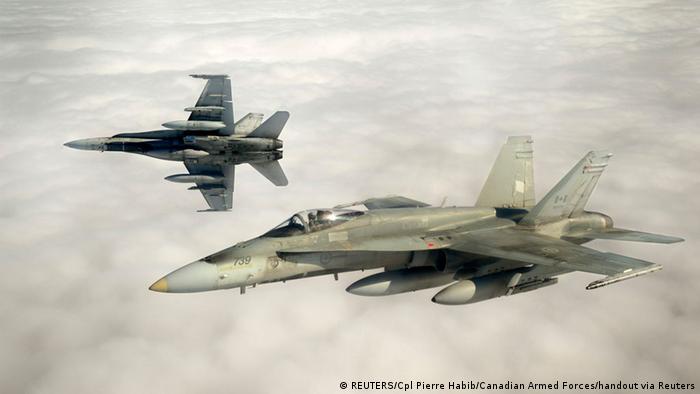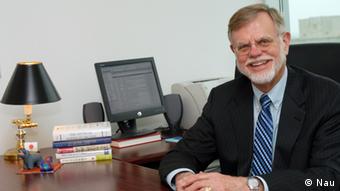NATO should act now, not later
NATO may be waking up to the single most important lesson of history. Use a little force early to avoid the use of greater force later. Just think if that lesson had been learned before World War II, says Henry Nau.
In Ukraine, a little force is being used early - but by only one side. Russia used a little force to occupy Abkhazia and South Ossetia in Georgia, then to annex Crimea, and today to dominate the governance of eastern and perhaps the rest of Ukraine. While Europe and America can't believe what Russia is doing, Vladimir Putin is already using a little force early to address his next objective. Since 2009 Russia has doubled its military forces along its border with the Baltic states - Estonia, Latvia and Lithuania.
Meanwhile, President Barack Obama announces, at a White House news conference, that "military options are not on the table in Ukraine because this is not a situation that would be amenable to a military solution." Will that be the case too, if Russia beats the West to the use of a little force early in the Baltic states?
Obama, who had no negotiating experience going into the Oval Office, is getting an education. Diplomacy is not a substitute for the use of force, to be used only if diplomacy fails. In fact, diplomacy will fail unless it is backed by force. And when negotiations fail, much more force is needed.
Just a little will do
Putin knows this. He sets up and surrounds his diplomacy by force. He doesn't want war. That's true. He wants to expand Russia's domain and influence peacefully. And he knows that the best way to do that is to use a little force first, especially when the United States is reluctant to use any force whatsoever after two wars in Afghanistan and Iraq.
So Putin expands defense spending in Russia by 79 percent over the past decade and plans to increase it by another 44 percent in the next three years. Kaliningrad bristles like "a giant aircraft carrier" with improved rapid reaction, long-range missiles and air defense capabilities.
In addition Putin organizes paramilitary forces that can operate across borders with deniability to stage protests, disrupt stability and eventually call for Russian help to salvage the peace. He probes incessantly for military advantage and leverage - securing naval facilities and arming Assad in Syria, using Iran as a stalking horse in Iraq and Afghanistan, and expanding Russian influence in central Asia as America leaves Afghanistan.
It is beyond credulity to blame NATO's expansion for Russia's actions. What conceivable threat did NATO pose when it expanded? It purposely kept ground forces out of the former Soviet satellite countries, made Russia a partner in the new NATO alliance, scuttled missile defenses that Russia opposed, and pushed arms control agreements that benefitted Russia - the Strategic Offensive Reduction Treaty (SORT) under Bush and New START Treaty under Obama.
Sure, weak and destabilized states like Georgia and Ukraine made mistakes. But big enough mistakes to threaten Russia?
Buying time...but for what?
Now, the diplomacy-only advocates make the same arguments, especially in Europe. Don't rearm NATO. That will just provoke the Russians. Solve the problem diplomatically. But that kind of diplomacy, like the recent agreement in Geneva to deescalate the crisis, just buys time for the paramilitaries in Ukraine to complete their work by force.
Because NATO failed to use a little force early, eastern and maybe the whole of Ukraine is lost today without a much greater use of force, which neither Europe nor America can stomach. But there is a chance that NATO can wake up and use a little force early in the NATO border countries that are next on Moscow's list. If it doesn't, NATO will face exactly the same problem of having to use much greater force later, and again perhaps not being able to stomach it.
Under its resolute Secretary General Anders Fogh Rasmussen, NATO is considering moving ground forces into Romania, Poland and Latvia, increasing and upgrading the aircraft that patrol NATO's airspace, and resuming work on stalled missile defenses. For all the talk of sanctions and long-term energy alternatives, these military moves are the ones that really matter. What good does it do to reduce Europe's energy dependence on Russia after Russia effectively colonizes or "Belarussifies" Ukraine, Moldova, Poland or the Baltic states?
Keep the channels open
At the same time, however, do not sever all day-to-day ties between NATO and Russia. Just as diplomacy does not substitute for force, resolute military actions do not substitute for diplomacy. Develop an off ramp for Russia, whether it wants it at the moment or not. Invite Moscow to observe military moves on NATO's side of the border if Russia reciprocates on its side of the border. Propose more joint ventures between Russian and western firms. Russia is light years behind China in modernizing and, with an economy totally dependent on energy and vulnerable to the next downturn of oil prices, needs more foreign investment. Encourage more exchanges of students, farmers and other civilian groups between Russia and western citizens to dampen the blatant anti-western propaganda Putin fulminates.
If Europe and the United States are unwilling to arm their diplomacy with small force now, they are condemned to use much greater force later, probably after they are attacked. Remember the Blitzkrieg and Pearl Harbor. History does not repeat itself but it rhymes.
Henry Nau is Professor at the Elliott School of International Affairs at the George Washington University and was a White House aide to Ronald Reagan between 1981-83. He is the author most recently of "Conservative Internationalism: Armed Diplomacy Under Jefferson, Polk, Truman and Reagan" (Princeton 2013). dw de



No comments:
Post a Comment